Publications
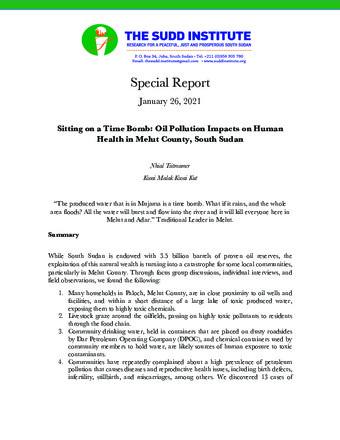
Sitting on a Time Bomb: Oil Pollution Impacts on Human Health in Melut County, South Sudan
Authors: Nhial Tiitmamer, Kwai Malak Kwai Kut
Type: Special Reports
Date: 26/01/2021
While South Sudan is endowed with 3.5 billion barrels of proven oil reserves, the exploitation of this natural wealth is turning into a catastrophe for some local communities, particularly in Melut County. Through focus group discussions, individual interviews, and field observations, we found the following:
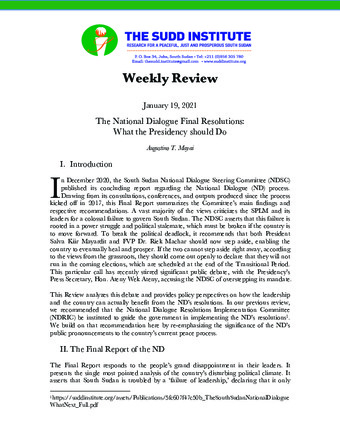
The National Dialogue Final Resolutions: What the Presidency should Do
Author: Augustino Ting Mayai
Type: Weekly Reviews
Date: 19/01/2021
In December 2020, the South Sudan National Dialogue Steering Committee (NDSC) published its concluding report regarding the National Dialogue (ND) process. Drawing from its consultations, conferences, and outputs produced since the process kicked off in 2017, this Final Report summarizes the Committee’s main findings and respective recommendations.
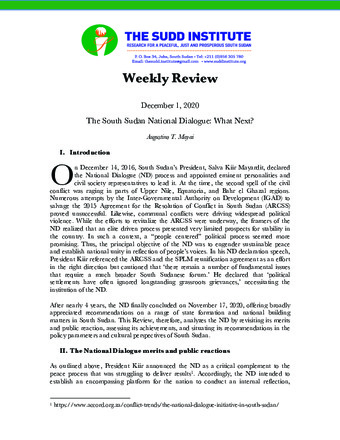
The South Sudan National Dialogue: What Next?
Author: Augustino Ting Mayai
Type: Weekly Reviews
Date: 01/12/2020
After nearly 4 years, the ND finally concluded on November 17, 2020, offering broadly appreciated recommendations on a range of state formation and national building matters in South Sudan. This Review, therefore, analyzes the ND by revisiting its merits and public reaction, assessing its achievements, and situating its recommendations in...
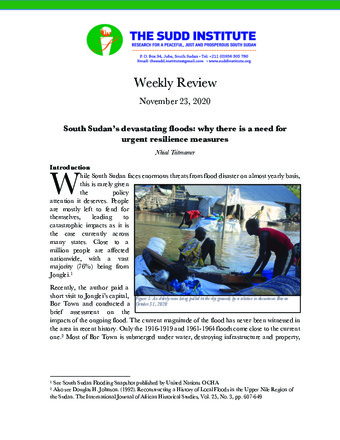
South Sudan’s devastating floods: why there is a need for urgent resilience measures
Author: Nhial Tiitmamer
Type: Weekly Reviews
Date: 23/11/2020
This review explores the magnitude of this year’s flood and its impacts in Bor Town. We used a boat to get us around the town surveying the extent of flood water and measuring its depth in the streets and in the residential neighborhoods.
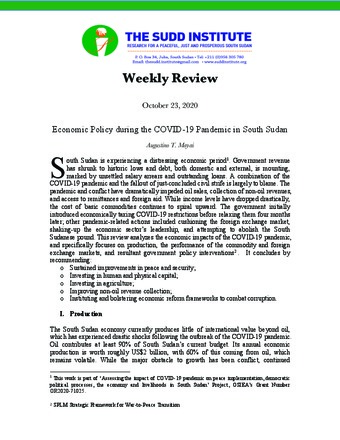
Economic Policy during the COVID-19 Pandemic in South Sudan
Author: Augustino Ting Mayai
Type: Weekly Reviews
Date: 23/10/2020
South Sudan is experiencing a distressing economic period. Government revenue has shrunk to historic lows and debt, both domestic and external, is mounting, marked by unsettled salary arrears and outstanding loans. A combination of the COVID-19 pandemic and the fallout of just-concluded civil strife is largely to blame.
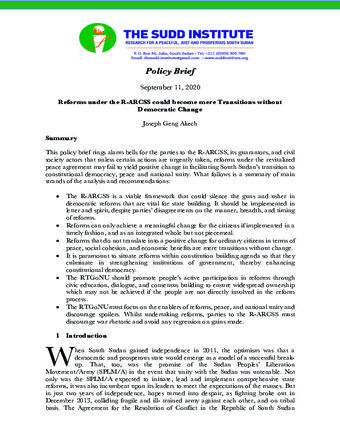
Reforms under the R-ARCSS could become mere Transitions without Democratic Change
Author: Joseph Geng Akech
Organization: The Sudd Institute
Type: Policy Briefs
Date: 11/09/2020
This policy brief rings alarm bells for the parties to the R-ARCSS, its guarantors, and civil society actors that unless certain actions are urgently taken, reforms under the revitalized peace agreement may fail to yield positive change in facilitating South Sudan’s transition to constitutional democracy, peace and national unity.
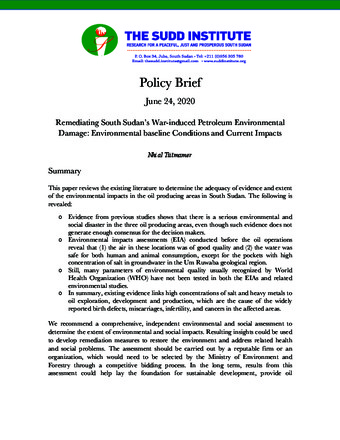
Remediating South Sudan’s War-induced Petroleum Environmental Damage: Environmental baseline Conditions and Current Impacts
Author: Nhial Tiitmamer
Type: Policy Briefs
Date: 24/06/2020
This paper reviews the existing literature to determine the adequacy of evidence and extent of the environmental impacts in the oil producing areas in South Sudan. The following is revealed:
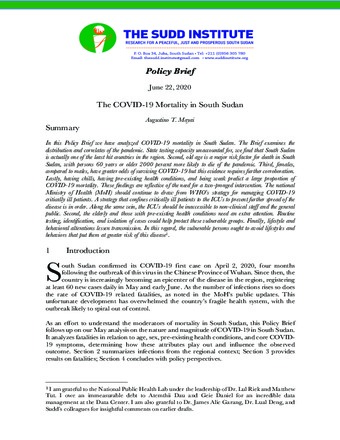
The COVID-19 Mortality in South Sudan
Author: Augustino Ting Mayai
Type: Policy Briefs
Date: 22/06/2020
In this Policy Brief we have analyzed COVID-19 mortality in South Sudan. The Brief examines the distribution and correlates of the pandemic. State testing capacity unaccounted for, we find that South Sudan is actually one of the least hit countries in the region.
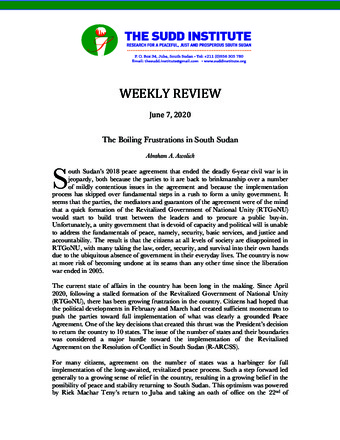
The Boiling Frustrations in South Sudan
Author: Abraham Awolich
Type: Weekly Reviews
Date: 07/06/2020
The current state of affairs in the country has been long in the making. Since April 2020, following a stalled formation of the Revitalized Government of National Unity (RTGoNU), there has been growing frustration in the country.
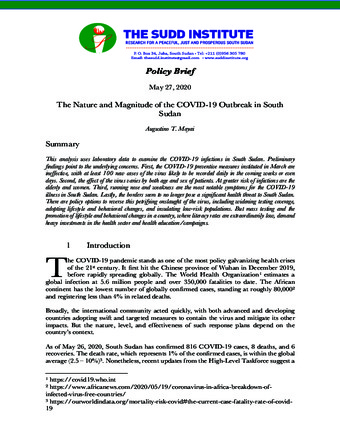
The Nature and Magnitude of the COVID-19 Outbreak in South Sudan
Author: Augustino Ting Mayai
Type: Policy Briefs
Date: 27/05/2020
This analysis uses laboratory data to examine the COVID-19 infections in South Sudan. Preliminary findings point to the underlying concerns. First, the COVID-19 preventive measures instituted in March are ineffective, with at least 100 new cases of the virus likely to be recorded daily in the coming weeks or even days.
